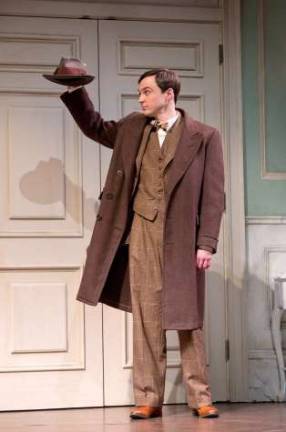The Big Bang Theory's Jim Parsons Shines in Dusty Broadway Revival

One of the more improbably entertainment victories scored in the last half-decade has been the emergence of Jim Parsons as a star thanks to The Big Bang Theory, Chuck Lorre's middle-brow CBS sitcom ode to geekdom. Parsons, an incredibly gifted actor of lanky stature and a protracted drawl, plays Sheldon Cooper, a misanthropic science genius fascinated by facts but with little use for other people. For him, friends are a convenience and entitlement that requires no reciprocation. Elwood P. Dowd, however, the protagonist of Mary Chase's Pulitzer Prize-winning Harvey, the chestnut being reincarnated by Roundabout Theater Company and director Scott Ellis at the Studio 54 Theater, has no problem making attachments. As many fans will remember, either from the 1944 play or its famous film version starring James Stewart as Elwood, he has a best friend. The only worries concerning those around him are that no one can see Harvey and that Elwood claims him to be a real, talking six-foot-tall rabbit. Despite a substantial cast of characters, Chase's play is both stuffy and yet under-stuffed, plot-wise. It contains but a few mildly entertaining misunderstandings and some mildly sharp musings. There are barely enough to fill one act, let alone the show's two. When Veta (Jessica Hecht, in the role that own Josephine Hull a Supporting Actress Oscar), Elwood's society-minded sister, tries to have her son committed, on-call therapist Lyman Sanderson (Morgan Spector) ends up putting her away instead. When she is released, chief psychologist William Chumley (Charles Kimbrough), fascinated in Elwood as a subject, opts to inject him with a drug that will make him "normal" (read into that what you will about any group's decision about what accounts for wrong or right behavior in a person, but you're on your own; Chase broaches the subject but then avoids probing it further). Harvey dances somewhere between the literal and metaphorical, however. Is it possible that Harvey actually exists? The play posits no, while through some resourceful sleight-of-hand, Ellis's production itself answers a firm maybe. The production also dials down Elwood's alcoholism to make him more reliably aware. What Parsons, the first to play Elwood since Stewart, then does is to make Elwood seem like the one with the tightest grip on reality among those he encounters. His calmness unnerves everyone around him. He shows how Elwood's remarkable observation has left him in the minority, and subjected him to speculation. Elwood has dealt with people his entire life, and almost all of them have disappointed or hurt him to some degree. Real or not, to him, Harvey is the first true friend he has made. It isn't that he is afraid for the others in his life to actually see Harvey at all. It's that he feels Harvey doesn't deserve to be forced to encounter all the others. Ellis directs the Harvey ensemble to a win-some-lose-some effect. Kimbrough and Tracee Chimo (as Veta's daffy daughter Myrtle Mae) are wonderfully in period, creating subtly comic caricatures that reveal themselves a bit more from scene to scene. Hecht and Spector, on the other, are a bit more obvious; they occasionally cheapen the material they think they are raising, and add to its dated feel. On the other hand, David Rockwell's revolving set suggests the perfect amount of period detail and commentary on both the Dowd home and Chumley's sanitarium. The main reason for Harvey's revival seems to be as a vehicle for Parsons, who is perfectly suited to filling Stewart's shoes, offering a gentility that masks Elwood's observations of human flaw without totally disguising them. But all of the actor's prominent roles ? in Harvey, Big Bang, even last year's The Normal Heart revival, in which he played a featured part ? ask him to speak in non-contemporary rhythms. (Elwood even shares Sheldon's quirky specificity. When a taxi driver responds to a dinner invitation by saying "Glad to," Elwood's response is to say "When? When would you be glad to?") What this actor needs to do to maintain his currency ? and it would be a real shame for his to be misspent ? is grab onto something a bit more modern, something that taps into the zeitgeist and allows him to show off grittier edges. (This also applies to two other performers, Amy Adams and Kelli O'Hara, who have yet to grab onto a signature role that fully puts all of their versatile skills on display). The greater question is not whether Harvey will ever be seen, but what kind of career one can expect from the wonderful actor portraying his best friend. Harvey Studio 54, 254 W. 54th St. 212-719-1300. [www.roundabouttheatre.org](http://www.roundabouttheatre.org/). Through Aug. 5.